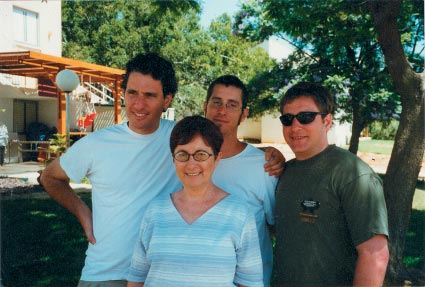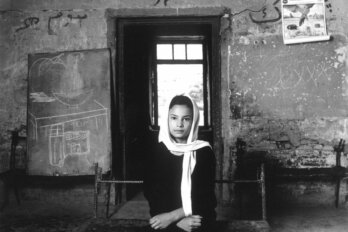
herzliya, israel—Here I sit, in the heat and humidity, with a salary that would insult most North Americans, and a Canadian passport in my hand. At least it’s relatively calm here near Tel Aviv, and Herzliya is an unlikely target for rockets from Iran. Still, at twenty six, married, but unencumbered by children, by day editing Web articles for Maariv (a Hebrew newspaper), at night I sit wondering if staying and fighting for Israel is worth it any longer.
Amit, my brother, lives in Jerusalem, home to growing soup kitchens, constantly threatened, and where, it seems, every hunk of gravel is contested. What a life. Twelve years ago, Ari, our older brother, left to study at the University of Toronto. He hasn’t returned. Maybe he saw what was coming ?
Having just “celebrated” its fourth anniversary, the Al Aqsa Intifada grinds on, and with it the walls of suspicion, fear, and hate become more deeply rooted than Ariel Sharon’s eight-metre-high barrier of protection. The collapse of the high-tech bubble, “al nasdaq,” hurled the Jewish state into economic depression, increased dependency on the West and our Diaspora brethren, and sent most grubbing after scarce capital.
Add to this rising crime, political corruption, hawks and doves forsaking debate in favour of entrenched ideologies, an Arab minority that many Israelis think of only as a haunting statistic—“They keep having babies, their numbers are growing”—and the dreams of idealistic youth calcifying into something harder, sterner, more about what must be done to thwart the enemy.
It is not what my parents had in mind. Born in Toronto, my father (Mel, now sixty-four) and my mother (Judy, now fifty-nine, a Polish Jew who emigrated to Canada when she was six) came to Israel just after the 1967 war. They decamped from Canada during its centennial year—its arrival, through Expo, onto the world’s stage—for an even greater hope: crafting a new society from the seed-beds of Gesher Haziv, a kibbutz near Israel’s northern border. My brothers and I were all born at Gesher Haziv. In the near beyond there were troubles, but there, nestled in a commune of hope, enthusiasm triumphed over experience and marked our early lives.
During the periods of relative peace, that vibrant experiment in social democracy actually worked for awhile. Tortured histories found ways out of the darkness. Sometimes two steps forward were quickly followed by two steps backwards, but there was always talk, among ourselves and with others. Now, for many Israelis—riding buses that might be blown up; always checking, before entering, for armed guards stationed at malls or cafés; hearing fireworks and thinking “katyusha rocket”—there is only foreboding silence, or escape into irony. A society so young shouldn’t have to grow up so quickly.
So, Ari’s gone. Amit remains, but as a “refusenik” who spends his “milium month” in a military prison each year. I continue to serve as a reservist, not liking it one bit.
People are leaving because the dream has died, and because if the name of the game is simply opportunity and feeding your children, this can be done anywhere. They are being “replaced” by economic migrants, or by those escaping anti-Semitism in France, Russia, and other countries that are failing as places where Jews can feel at home. When new populations arrive with a different sense of history, with very different views of how the state should be implemented on the ground, conversation lapses into isolationism. It’s hard to know whom to talk to, and how to talk to them.
It is no secret that Israel is now at a precipice. Despite assurances from Washington and elsewhere, its future as a state is by no means guaranteed. But I’ve decided those who claim it’s not worth it are dead wrong. With our sometimes bad manners, our uneasy temperament, and our peculiar logic, Israel is our home. Without it, even Ari in Toronto will be lost.




